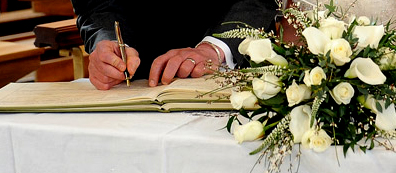 The Marriage provisions of the Civil Registration Act, 2004 became law on 5th November, 2007. This legislation brought about major changes in the procedures for solemnising and registering marriages in the Republic.
The Marriage provisions of the Civil Registration Act, 2004 became law on 5th November, 2007. This legislation brought about major changes in the procedures for solemnising and registering marriages in the Republic.
The main changes in relation to religious marriages are as follows:-
– the requirement that all couples attend in person at the Registrar’s office to give their notification, establish their identity and freedom to marry and sign declarations of no impediment;
– the requirement that all couples must be issued with a Marriage Registration Form (MFR) by a registrar before the marriage can proceed;
– the new Register of *Solemnisers; all those solemnising marriages in the State on or after 5th November, 2007 must be on this Register which is maintained by the General Register Office. The Register of Solemnisers is maintained by the General Register Office and only GRO staff can add, delete or amend registrations. If your priest resides outside the state, please ask him to contact the GRO Marriages Unit, Government Offices, Convent Road, Roscommon, phone + 353 (0)90 6632945/6/7/8/9 or website www.groireland.iE
Marriage Registration
For couples where one or both parties are resident abroad, they should contact the office by telephone to book their appointment. To notify the Registrar of your intention to marry you may book a Marriage Notification appointment at www.crsappointments.ie
All couples must contact the Registrar and make an appointment to give their three month’s notification of intention to marry (in person). (We would recommend that you contact the Registrar at least six months in advance of your wedding date.) As registration districts are being abolished, you may do so at any office in the country, not necessarily in the area where you intend getting married (Dublin – Phone +353 (0)1 8638219/20). The contact details of all Civil Registration Service offices and additional information pertaining to Getting Married in the Republic of Ireland is available at the following link www.civilregistrationservice.ie. It is advisable to read this information prior to booking your appointment to meet the Registrar to serve notice of your intention to marry.
All couples will be requested to bring with them to the appointment:-
– Photo ID (preferably a passport or driving licence)
– If one or both of you is divorced, the original divorce decrees in respect of any previous divorces you may have
– If one of you is widowed, the death certificate of your previous spouse
– Name and address of the priest who will officiate at the marriage; this presumes that the celebrant is a registered solemniser and that he has agreed to officiate at the marriage
– Name and address of the church where you wish to be married
– Date of marriage
– Names and dates of birth of your witnesses (Best man / Chief Bridesmaid)
– Your PPS Numbers (where either or both of the parties have one)
– Birth Cert (and photocopy of Birth Cert)
– Proof of address – utility bill.
– Cost €200
It is important that couples have all documentation in order before their visit to the Registrar’s Office in order to avoid the necessity for a second visit. Without the Marriage Registration Form (MRF) the couple cannot get married nor may the solemniser proceed with the marriage ceremony.
MARRIAGE REGISTRATION FORM (MRF): The marriage cannot proceed without this form. Section 6 has to be completed in the Church ON the day of the wedding by the Priest, Groom, Bride, Best Man and Chief Bridesmaid. This form (MRF) will be given to you on the day of your interview with the Registrar.

Last-minute amendments to the Marriage Registration Form (MRF)
While couples will be requested to ensure that any necessary changes to the MRF are notified to the Registrar in advance of the ceremony so as to allow for it to be amended and re-issued, situations will arise (e.g. illness of the solemniser, etc.) where changes will have to be made to the MRF at the ceremony. When this arises, the necessary amendment(s) should be clearly made on the MRF by the solemniser and initialled by the solemniser, both parties and both witnesses. There is a section at the end of the MRF which should also be completed and signed, explaining the nature of and reason for the changes.
The priest who officiates at a wedding – from the perspective of civil law – is known as the ‘Solemniser’ of the marriage.